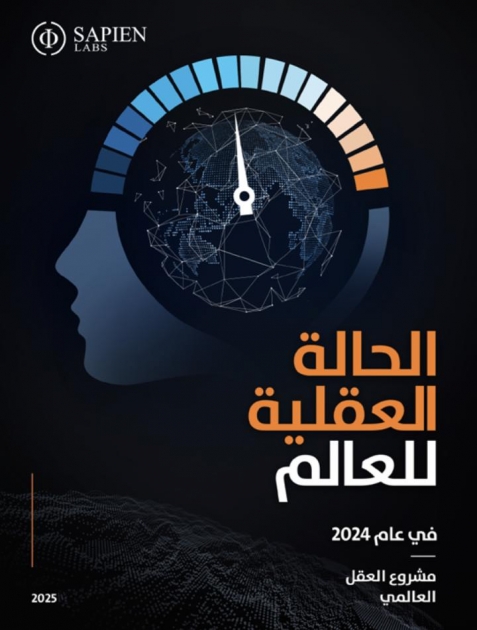
UAE Ranks First in MENA & Arab World and in Top 20 Global List for Older Adults’ Mind Health Reveals Sapien Labs’ Mental State of the World Report 2024
In the Mental State of the World Report 2024, measured by the Mind Health Quotient (MHQ)*, the United Arab Emirates (UAE) stands out for having the best mental state for adults aged 55+ in the Middle East and North Africa (MENA) region – and one of the healthiest across the world. With an MHQ score of 112.5, the country ranks among the top 20 globally, alongside Singapore, Malaysia, and Finland. UAE and Finland are the only Arab and European countries in this MHQ range, respectively.
The annual report, released by Sapien Labs – a global leader in mental health research – surveys internet-enabled populations*. Participants from the UAE began contributing to the report in 2021, with their numbers increasing by 57% in this survey* compared to last. The country joined nine other Arab countries* whose combined input accounted for 10% of more than 1 million responses captured in 2023 and 2024 across 82 countries.
The data on mind health status is measured using the MHQ, which reflects the ability to navigate life’s challenges and function productively. Results in this report were consolidated into two age groups – younger adults (18-34) and older adults (55+) – where outcomes diverged significantly. Global findings showed that while older adults demonstrated strong mental resilience, younger generations experienced a sharp decline in mind health and wellbeing, which reflects the lingering COVID-19 pandemic impact, with no signs of recovery.
In the UAE, participating younger adults scored 16.8% better than the global average, with an MHQ of 44.4 – yet it remains low, pointing to a pressing need for collective action across the Arab World and globally. For the overall population, the UAE recorded an MHQ of 65.7, faring 4.6% better than the global peers average and ranking fourth in MENA, buoyed by the 55+ adults exceptionally strong MHQ and the 35-44 and 45-54 adults who scored 70 and 90.9 MHQ, 21% and 23% above global averages, respectively.
The global youth MHQ scored just 38, with only 18% of countries showing average scores above 50, and 41% of younger adults classified as distressed or struggling. This sharp decline across the world is characterised by deteriorating abilities to control and regulate thoughts and emotions, and to form and maintain positive relationships with people.
Tara Thiagarajan, Ph.D., Founder and Chief Scientist at Sapien Labs, said: "The UAE shows one of the healthiest global mental states for 55+ adults, joining peers in Africa, Central and South America, Europe, and Southeast Asia. It is the only Arab country scoring above 110 and the first in MENA. While older adults fared well with an MHQ of 112.5 and a distress level of just 9%, the participating younger adults scored an MHQ of 44.4 with a distress level of 36.9%, reflecting a considerable 2.5-fold and 4-fold generational disparity, respectively. The youth distress average across Arab countries reached 36.3%, with a generational gap of nearly 3.8-fold.”
The report revealed that a near majority of younger generations across 82 countries experienced functionally debilitating struggles or distress, with MHQ scores ranging from 5 to 71 – over 60 points lower than those of older adults. The report measures all aspects of mental function: emotional, social, and cognitive, so this is not just about happiness, anxiety, and depression indicators, but of the core mental functioning that is needed to navigate life’s challenges and function productively.
Tara commented: “This trend in the UAE and the Arab World is mirrored globally. Our report suggests that younger generations are often merely enduring life rather than thriving. These pressures on youth, combined with the widening generational gap, mean that the incoming workforce may not be equipped to cope with everyday life and could face serious consequences such as lower productivity, more absenteeism, increased anxiety, and even more conflict in daily life. In the UAE, adults aged 35-44 – the engine of productivity and workplace stability – fared a notable MHQ of 70, which is 21% higher than the global average and the third-best in MENA. With a growing influx of expat youth who represent the future talent pipeline, safeguarding their mental wellbeing is essential for long-term workforce stability, innovation, and economic adaptability. Given that expats make up around 88% of the country’s population, striking a balance between nurturing emerging talent and supporting mid-senior professionals is crucial to sustaining both workforce resilience and broader economic health.”
The report attributed the drop in mind health among adults under 35 to multiple interconnected factors including fewer social connections, early use of smartphones, increased consumption of ultra-processed foods, and greater exposure to environmental toxins. The data suggested that stronger community and family ties, later smartphone exposure, healthier diets, and more direct social interactions could improve outcomes by building emotional resilience, especially where digital connectivity is increasing and traditional structures are weakening.
In the Arab World, 74% of participating older adults reported feeling close to family which is significantly higher than in Western countries. However, only 45% of younger adults felt the same, suggesting a rapid shift away from the region’s traditionally strong familial bonds. This cultural change, which has long helped protect previous generations, has a major impact on numerous factors of mind health, including the ability to form and maintain relationships with others, rising feelings of sadness and hopelessness, and increasing fear and anxiety.
Tara continued: “The UAE’s vision for both wellbeing and sustainability includes promoting mental health and wellbeing and ensuring environmental responsibility and resource efficiency. This is ensuring people enjoy high living standards and long, healthy lives which is clearly reflected in the surveyed 55+ adults and helping protect youth from environmental toxins. For younger adults, the country’s demographic structure and diversity could be contributing to changing family dynamics. Other global drivers of generational mental health decline that may apply to the UAE include the consumption of ultra-processed foods which is still lower than global averages but rising fast and the early smartphone use, which needs addressing, especially in childhood.”
The scientists’ analysis also revealed that younger generations worldwide are experiencing fewer close friendships, more online time, and less healthy diets which correlate with worsening mental wellbeing. Crucially, these trends persisted across all countries irrespective of spending levels on mental health services or research. The findings call for a shift in research strategy and a reorientation of approach to better understand and address root causes.
Tara concluded: “The world’s mental state is clear – and alarming. Across every region, older adults are doing relatively well, while younger generations are struggling. These generational trends have created a global crisis that continues to deepen. If left unaddressed, maintaining a stable society may soon become impossible. From the impact of technology and culture to increasing chemical exposure in both food and the environment, it is imperative to take bold, preventative action grounded in a deep understanding of the real causes.”
---
* Data is collected using the MHQ assessment, a comprehensive online survey of mental function that provides an overall metric (the MHQ score) that relates to the ability to navigate the normal stresses of life and function productively.
* MHQ scale has been calibrated such that the expected mean of a normal functioning population is 100 based on pre-pandemic 2019 data. The MHQ score ranges from -100 to +200, with negative scores indicating severe mental distress and functional impairment, and positive scores representing a normal distribution of functioning.
* The report findings reflect only Internet-enabled populations and do not count those without digital access or literacy.
* The featured
Arab countries
in the report are Algeria, Egypt, Iraq, Jordan, Morocco, Saudi Arabia, Sudan, Tunisia, United Arab Emirates, and Yemen.





























